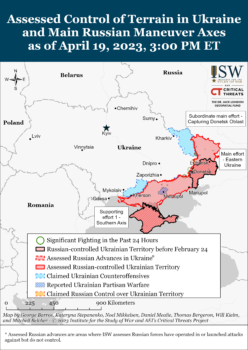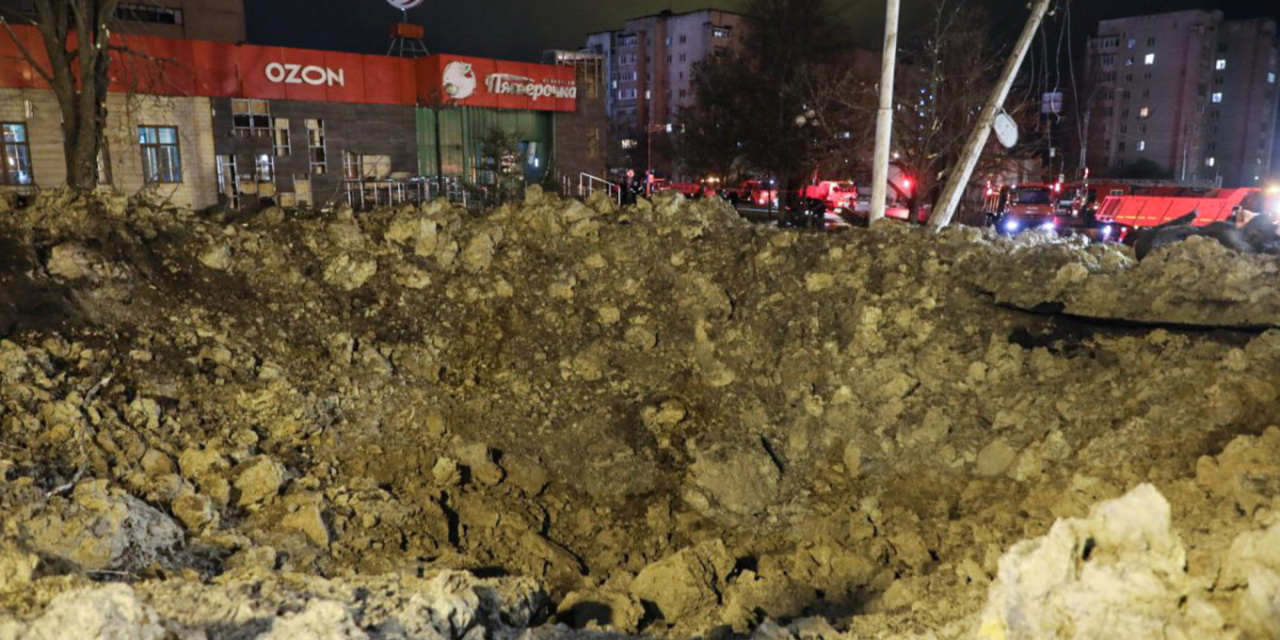A 65-foot crater in a main street in Russia’s Belgorod after a strike by a Russian Su-34 fighter-bomber, April 20, 2023
VideoCast Special: Russia’s Ukraine Invasion and the 21st-Century World
Kremlin Plot: A “Germany Front” Breaking Support For Ukraine
US Intelligence: Ukraine Military Proposed Attacks on Russian Forces in Syria
Thursday’s Coverage: Patriot Air Defense Systems Arrive

Map: Institute for the Study of War
UPDATE 1248 GMT:
The UK has sanctioned five Russian officials involved in the 25-year prison sentence of dissident Vladimir Kara-Murza on Monday.Judge Elena Lenskaya, who approved Kara-Murza’s arrest, investigators Denis Kolesnikov and Andrei Zadachin, and two agents of the FSB security service, Alexander Samofal and Konstantin Kudryavtsev, have been named.
Kara-Murza’s wife Evgenia criticized London earlier this week for weakness in not announcing any sanctions over the political prosecution and sentencing of her husband.
Kara-Murza’s lawyer Vadim Prokhorov, threatened with prosecution, fled Russia before the verdict.
Prokhorov said Thursday:
Both the prosecutor and the judge found different reasons to say that not only should I be disbarred, but that the question of my own criminal prosecution should also be considered.
I also got a warning from one particular politician who said one of the Prosecutor General’s deputies overseeing our case might be interested in the new one.
UPDATE 1052 GMT:
Since July, Russia has been pursuing the development of a bloc of German activists — linking the far right and the left — to oppose support for Ukraine against Vladimir Putin’s invasion.
Documents from a “European intelligence service” detail the operation, first proposed by Kremlin Deputy Chief of Staff Sergey Kiriyenko to political strategists on July 13 as the “focus” of efforts to undermine European support for Ukraine.
At least one person close to Sahra Wagenknecht, of the left-wing Die Linke party, and several members of the far-right Alternative für Deutschland were in contact with Russian officials as the plans were drawn up.
Russian officials set the goal of winning “a majority in elections at any level”, boosting AfD beyond its 13% in polling. Kremlin political strategists wrote a proposed manifesto for the AfD that would make it the party of “Germany unity”. Sanctions on Russia would be declared as anathema to German interests.
The manifesto declares:
Inadequate politicians, unable to calculate the consequences of their decisions, have dragged Germany into conflict with Russia — a natural ally of our country and of our people.
Our interests demand the restoration of normal partnership relations with Russia….Today in Germany there are only two parties: the party of enemies of Germany and the party of its friends.
It is unclear if the manifesto was ever delivered to AfD officials.
However, one official in the AfD and another close to Wagenknecht confirmed they were in contact with Kremlin officials or Kremlin allies. Three AfD lawmakers traveled to Russia on September 20 but broke off the trip within 24 hours following public criticism over their plans to visit the Russian-occupied Donbas area in eastern Ukraine.
UPDATE 1032 GMT:
US intelligence assessed in January that Ukrainian forces would soon be overrun in the city of Bakhmut in eastern Ukraine.
The American analysis, marked Top Secret, said “steady” Russian advances since November “had jeopardized Ukraine’s ability to hold the city”. The analysts concluded Ukrainian forces would probably be “at risk of encirclement, unless they withdraw within the next month”.
Ukrainian defenders still hold about 20% of the center of Bakhmut amid the 11-month Russian assault, and a route to the west of the city is still open although threatend by Russian fire.
The Ukrainian commander overseeing the defense, Col. Pavlo Palisa, says that his forces have defied the US prediction through a combination of classic urban warfare and advanced drone reconnaissance, including layers of signal jamming.
If we don’t have eyes in the air we can’t engage the enemy by artillery fire. Why it’s important is because we don’t have many artillery rounds. So our artillery fire must be precise.
The commander, who took over in Bakhmut in mid-January, said his troops have learned from Russian tactics to mask a drone’s “home point” or coordinates that would reveal the location of the unit.
“If they find our drones, it will give them information that the home point of the drone is somewhere in Australia,” he says.
Palisa recalled that, when he arrived in Bakhmut, Ukrainian officers echoed the US analysts.
“Those guys said ‘I don’t know, maybe two or three weeks.’ But months later and we’re still here, trying to do our best to hold the city,” he explains.
UPDATE 0916 GMT:
Following his visit to Kyiv and discussion with Ukraine President Volodymyr Zelenskiy (see Thursday’s Coverage), NATO Secretary General Jens Stoltenberg has confirmed that Ukraine will eventually join the 31-nation alliance.
Speaking before an international coalition meeting at Ramstein airbase in Germany, Stoltenberg said that, once Russia’s invasion has been defeated, Ukraine must have “the deterrence to prevent new attacks”.
President Zelensky's office confirms to me this morning that he accepted Stoltenberg's invitation to the NATO summit in Vilnius in July. But: "Final decision will depend on the situation on the ground at that point." https://t.co/qfLupLMzdS
— Christopher Miller (@ChristopherJM) April 21, 2023
UPDATE 0653 GMT:
The Kremlin suddenly demoted the commander of Russia’s Pacific Fleet on Wednesday.
Deputy Prime Minister Yury Trutnev announced that Adm. Sergey Avakyants had been reassigned to the headquarters for military sports training and patriotic education centers.
The Pacific Fleet claimed that the reassigment because Avankyants, 66, is over the age limit of 65 for military service, but Russian State media outlet TASS cited denials by sources.
Several Russian commanders –– including the Chief of the General Staff and overall commander of the Ukraine operation, Army Gen. Valery Gerasimov, and Commander-in-Chief of Ground Forces Oleg Salyukov — are older than 65.
Ayankants’ reassignment came five days after Defense Minister Sergey Shoigu announced a surprise readiness check of the Pacific Fleet.
UPDATE 0648 GMT:
A husband and wife have been killed in Russian shelling of the Zaporizhzhia region in southern Ukraine
The head of the military administration, Yurii Malashko, reported, “The Russian projectile has killed a family in Mala Tokmachka. A man, 54, and a woman, 65, died in their own yard.”
A 62-year-old woman was injured in Kamianske as she returned home with bread for herself and her neighbors.
UPDATE 0638 GMT:
The Ukraine Air Force said air defenses destroyed eight of “up to 12” Iranian-made attack drones launched from Russia’s Bryansk region overnight.
The Kyiv regional military administration reported at 5:40 a.m. that “about eight” Shahed drones had been downed.
Officials in Poltava in central Ukraine say a drone destroyed civilian infrastructure. There were no casualties.
Russia has attacked with more than 30 drones in the past three days. About 70% have been downed, and the only other reported damage was a facility in the Odesa region on Wednesday.
ORIGINAL ENTRY: A Russian warplane bombed Russian territory late Thursday, damaging buildings and leaving a 65-foot crater.
Local authorities reported an explosion in Belgorod, a staging point for Russian forces near the Ukraine border. Two people have been injured.
Governor Vyacheslav Gladkov announced a state of emergency. He referred to the crater on a main street and said four cars and four apartment buildings were damaged.
Video showed piles of concrete on the street, several damaged cars, and a building with broken windows. A car was flung upside down onto the roof of a store.
After the accident with aviation ammunition in #Belgorod, two people were injured, destruction was revealed in four apartments. pic.twitter.com/m5hPg7sDpc
— NEXTA (@nexta_tv) April 21, 2023
The Russia Defense Ministry subsequently said, “As a Sukhoi Su-34 air force plane was flying over the city of Belgorod there was an accidental discharge of aviation ammunition.”
Since last summer, support sites for the Russian military, including oil depots, have been struck in Belgorod. The Ukraine Government and military has refrained from claiming responsibility.
The Ministry did not say what weapon was used by the Su-34, a supersonic fighter-bomber jet. It said an investigation has begun.
Clearer video of a Russian bomb that detonated in Belgorod last night. pic.twitter.com/vZnoFFvq7J
— Dmitri (@wartranslated) April 21, 2023

